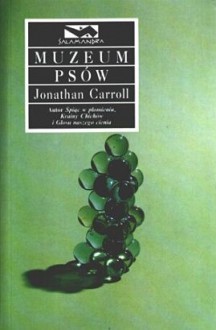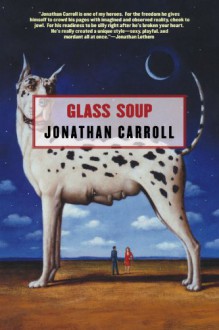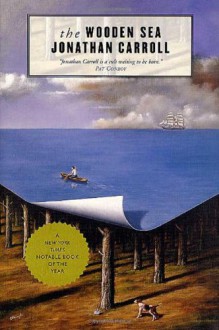
„Czasami droga jest jedynym ciałem stałym pod stopami człowieka, a zatrzymał się on, ponieważ musi spojrzeć na nią, właśnie teraz, by się upewnić, że tam jest. Bo nie ma niczego innego.”
Jonathan Carroll, „Muzeum Psów”
"If you're going through hell, keep going."
Winston Churchill
„Muzeum Psów” to pierwsze moje spotkanie z Carrollem. Wcześniej „znaliśmy się tylko z widzenia”. Znajomości nie pogłębiła nawet zakupiona przeze mnie „Szklana zupa”, która do tej pory łypie na mnie złowrogo z półki, czując się całkiem zapomniana. Długo dojrzewałam do decyzji, żeby wrócić do fantastyki, z którą przecież niekoniecznie się lubię. Realizm magiczny? Miałam spore wątpliwości. W końcu przełamałam się i zaryzykowałam. Po lekturze mogę uderzyć się w pierś. „Muzeum Psów” należy do czołówki przeczytanych przeze mnie ostatnio książek.
Bohaterem powieści jest Harry, sławny architekt. Świat okrzyknął go geniuszem, a główny zainteresowany chełpi się tym na każdym kroku. Uważa się niemal za boga – szuka miejsc „niedokończonych” – takich, w których mógłby się zabawić w Wielkiego Kreatora. Nie interesują go kompletne przestrzenie. Tylko to, co może zostać wypełnione przez realizację jego projektu, zasługuje na uwagę. Ten swoisty pociąg do niekompletności odbija się na innych sferach życia Harry’ego. Choć kobiety do niego lgną, nie potrafi podjąć decyzji, która jest tą jedyną. Związek małżeński jest relacją, w której szybko zaczyna się dusić. Znacznie bardziej interesują go relacje niesformalizowane. Jak można się łatwo domyślić, jego partnerki pragną jednak poczucia stabilizacji. Tymczasem Harry do tego stopnia nie potrafi (i nie chce) składać kolejnej przysięgi małżeńskiej, że… decyduje się na dwa nieformalne związki jednocześnie. Obie kobiety o sobie wiedzą. Akceptują ten stan, choć się nienawidzą. Harry siedzi na tykającej bombie. Jakby tego było mało, kontaktuje się z nim sułtan Saru. W pełni świadomy, że jego życiu zagraża niebezpieczeństwo, uznaje, że to ostatni moment, żeby zapisać się w pamięci potomnych. Prosi Harry’ego o to, żeby zaprojektował tytułowe Muzeum Psów. Wkrótce okazuje się, że budynek znaczy dużo więcej, niż można by się było tego spodziewać.
„Muzeum Psów” jest książką trudną. Nawet teraz, kilka godzin po lekturze, mam wrażenie, że wielu aspektów nie zrozumiałam, nie wychwyciłam. Czytanie książki Carrolla przypomina trochę jedzenie pomarańczy. Kiedy już wydaje ci się, że obrałeś cały owoc i rzucasz się do jedzenia, zaczynasz mieć wrażenie, że coś jest nie tak, choć pyszny sok atakuje twoje kubki smakowe. Cholera, musiałeś nie zerwać białej części skórki. Tak samo jest w przypadku „Muzeum Psów”. Dosłownie zachłysnęłam się tym, co próbował mi powiedzieć autor, choć mam świadomość tego, jak wiele prawdziwej treści zdołało się przede mną ukryć. A przyznać trzeba, że pisarz ma wiele do powiedzenia.
Carroll wykorzystuje postać Harry’ego, żeby uświadomić czytelnikowi coś bardzo ważnego. Nie warto być pokornym, jeśli chce się zostać uznanym za geniusza. Jednak z pokorą znacznie łatwiej jest odnaleźć szczęście, które nie zawsze wiąże się z sukcesem zawodowym. Każdy z nas musi zadecydować, czego pragnie bardziej. Czy można połączyć obie te płaszczyzny? Pewnie tak. Ale musimy się tego podjąć sami, choć nikt nie jest w stanie nam obiecać, że nasze starania zakończą się powodzeniem.
Autor „Muzeum Psów” igra sobie nieco z klasyką. Tworzy motyw przeciwny do „Exegi monumentum”. Sugeruje, że niebezpiecznie jest skupiać się na efekcie dzieła. Efekt jest nietrwały. To, co zostaje wzniesione przez człowieka, przez człowieka może też zostać zniszczone. Jednak starania wkładane przez nas w pracę żyją tak długo, jak żyjemy my. Tworzą nas, kiedy my tworzymy nasze mniejsze lub większe dzieła. To, czy uda nam się stworzyć wymarzony efekt końcowy, zależy nie tylko od nas. Może się okazać, że będziemy często upadać. Może się okazać, że wielokrotnie będziemy musieli zaczynać od nowa. Pytanie brzmi: czy znajdziemy w sobie dość siły, żeby spróbować raz jeszcze? Jeśli tak, wygraliśmy sami ze sobą. Liczy się bowiem pokonywana przez nas droga.
Piękne w „Muzeum Psów” jest to, że powieść nie ma jedynej słusznej interpretacji. Książka zmienia się w zależności od tego, kto ją czyta. I choć równie dobrze stwierdzenie to można odnieść niemal do każdego utworu, to w przypadku Carrolla jest ono szczególnie trafne. Autor otwiera przed czytelnikami furtki. To, czy ujrzymy za nimi ukojenie, rozdrażnienie, smutek, ból, poczucie sensu czy niepewność, zależy tylko do nas samych.
Dawno nie namieszała mi tak w głowie żadna książka fantastyczna. Twórczość Carrolla, jeszcze kilka dni temu kompletnie mi obca, okazała się być silnym narkotykiem. I choć na co dzień jestem dość asertywna, z tym dilerem ciężko będzie mi zerwać kontakt…


 Log in with Facebook
Log in with Facebook 









